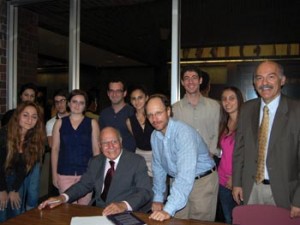Marine Vardanyan
Staff Writer

Photo: Erica Magarian
Former U.S. Secretary of the Navy and assistant Secretary of Defense Paul R. Ignatius returned to Fresno after many years to give a talk on his memoir titled, Now I Know In Part: An Armenian-American Reflects on His Life and Time. The Armenian Studies Program at Fresno State and the National Association for Armenian Studies and Research co-sponsored the September 12, 2012 lecture, which included reflections from Mr. Ignatius’ life and his accomplishments.
Mr. Ignatius began the lecture by first speaking of his family background in America and historic Armenia. While growing up in Glendale, Ignatius described the great difference between the Glendale of his childhood and the present-day city. He recalled a time when the population of Armenians at Glendale’s Hoover High School consisted of only three people, his brother, sister, and himself, a significant difference from the large Armenian school population of Glendale today.
Reflecting further into the past, Mr. Ignatius described his family roots and the hardships and strains his family endured. Thriving in historic Armenia, Ignatius’ family distributed cotton in the Ottoman countries prior to 1893, but during the Hamidian massacres, 1895-1896, the whole family, except for his grandfather, was murdered.
Mr. Ignatius continued to detail his father’s immigration to America in 1904, following his four brothers, who had also escaped the Hamidian Massacres. Having attended the Euphrates college in Kharpert, and being fluent in English, Ignatius’ father attended college in New York, and moved to California after meeting his wife.
Ignatius’s father gained the nickname “Patriarch” because of his imposing manner and his strong involvement with Armenian causes in Southern California.
Mr. Ignatius commented about the impact Armenians, like his father, have had in their communities. While visiting Singapore with his wife, he discovered the Armenian Church built in 1835 and remarked that, “Where they [Armenians] go, things happen.”
Mr. Ignatius concluded his lecture by discussing issues and goals that Armenians in Armenia and the Diaspora face. He commented on his desire to see the establishment of a distinguished Armenian museum, to demonstrate the contribution of Armenians in America, in various fields such as politics, business, music, and the arts.
Mr. Ignatius also spoke about the 100th Anniversary of the Armenian Genocide, and whether reconciliation can and should take place, a subject that he discusses more in his book.
Mr. Ignatius took his audience on a journey through his family background, shared his vivid collection of childhood stories and vibrant characters from his past, and discussed, on a more serious note, important issues that pertain to all Armenians.
 Hye Sharzhoom Armenian Action
Hye Sharzhoom Armenian Action